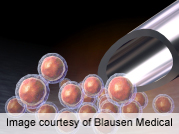Small initial trial shows improvement for people with relapsing-remitting MS
WEDNESDAY, Jan. 21, 2015 (HealthDay News) — A therapy that uses patients’ own stem cells may be able to reverse some of the effects of multiple sclerosis (MS), a preliminary study suggests. The findings were published in the Jan. 20 issue of the Journal of the American Medical Association.
Richard Burt, M.D., chief of immunotherapy and autoimmune diseases at the Northwestern University Feinberg School of Medicine in Chicago, and colleagues tested a new approach: essentially, “rebooting” the immune system with patients’ own stem cells. The researchers removed and stored stem cells from MS patients’ blood, then used relatively low-dose chemotherapy drugs to — as Burt described it to HealthDay — “turn down” the patients’ immune-system activity. From there, the stem cells were infused back into patients’ blood.
Eighty-two people were followed for two years after they had the procedure. Half saw their score on a standard MS disability scale fall by one point or more, according to Burt’s team. Of 36 patients who were followed for four years, nearly two-thirds saw that much of an improvement. Of the patients followed for four years, 80 percent remained free of a symptom flare-up.
The therapy was only effective for patients with relapsing-remitting MS, however. It was not helpful for the 27 patients with secondary-progressive MS, or those who’d had any form of MS for more than 10 years. A clinical trial is underway at several medical centers, looking at patients with relapsing-remitting MS whose symptoms have failed to improve after at least six months on standard medications. They’re being randomly assigned to either stem cell therapy or further pharmacologic therapy.
Abstract
Full Text (subscription or payment may be required)
Editorial (subscription or payment may be required)
Copyright © 2015 HealthDay. All rights reserved.








